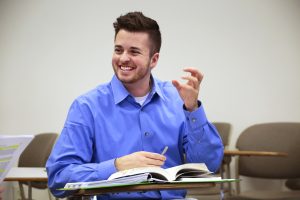
by Erica J Hill
K.J. Rawson is the director of the Digital Transgender Archive, an online platform providing digital versions of transgender historical records, born-digital records, and holdings of other repositories around the world. Despite not having professional training in archival studies, he took several Library and Information Science classes in his graduate program. K.J. Rawson is a professor of Rhetoric, English, and Gender Studies at the College of the Holy Cross in Worcester, Massachusetts. He has a Master’s Degree from University of Colorado-Boulder in English Literature focusing on Queer Theory and Critical Race Studies. He received his PhD from Syracuse University in Composition and Cultural Rhetoric.
The inspiration for the archives began when K.J. met historian Nick Matte, at a conference and discussed the challenges they faced when researching transgender history in archives. These challenges include the repositories knowledge of their materials and the environment of the reading room. The archives addresses the barriers in terms of accessibility. Archives may have documents that pertain to transgender history, however, it may be difficult for one to travel to a physical location and find materials.
The DTA functions as a union catalog, virtually bringing together materials that are relevant to the understanding and study of transgender histories. As the collecting policy states, the term ‘transgender’ is used to refer to a “broad and inclusive range of non-normative gender practices.” As such, the DTA considers transgender as a practice rather than an identity, allowing the archives to include a broad range of trans-historical and trans-cultural materials. The focus is on materials created before the year 2000.
What is special about the DTA is that, although there are no physical archives, K.J. has created a lab where student volunteers work to digitize and describe materials. Students also participate in the archives’ social media presence. The posts highlight materials in the archives, including newly added collections. K.J. uses his network of archivists, professors, and researchers, whom he has met at conferences and speaking engagements, to acquire materials for the archives. He uses skype and email the most when working with collaborators.
With a grant from the American Council of Learned Societies, he has hired a fulltime project coordinator to oversee the day-to-day activities of the archives. The College of the Holy Cross where KJ teaches, also supports the mission of the archives. By incorporating the materials from the DTA in his classes, he demonstrates its importance as an educational tool. Involving students in using the archives has led to more college support and feedback on the usability of the online platform and has helped streamline the functionality of the site.
The archives has a 10-member advisory board including individuals in the trans community who are located within and outside of Massachusetts. Part of the success of the archives is K.J.’s willingness to ask dedicated archivists and collaborators for their advice and insight. He believes that now is a good opportunity to make the resource available to educate people and organizations about the issues that transgender communities face.
The challenges of the archives include, meeting the expectations of stakeholders and completing projects with grant funding. While people from all over the world can access the materials online (provided they have a device), most information and description of holdings are in English. Efforts have been made to acquire collections in German, Spanish, Portuguese and several other languages. Another challenge involves acquiring materials without knowledge of who holds copyright. This prompted K.J. and his team to create a policy where materials that violate someone’s copyright will be taken down immediately. Direct materials from creators are preferred because of these copyright regulations.
The archives is an advocacy tool in itself to aid trans communities that are committed to education as a tool for social change. It exists to transform people’s perspectives of trans communities in history and present-day. It also has the capacity to inspire other archives to represent trans people in their own holdings. The possibility of physical exhibits based on the materials found online creates a push for users to advocate for the acquisition of materials related to trans history and culture. This push enables trans related museum projects to begin in non-exclusively trans institutions.
One project K.J. is looking forward to the digitization of a collection out of Berlin and establishing connections and relationships with archivists and trans community members in Venezuela.
To browse the Digital Transgender Archive, click here. To read K.J.’s research, including journal articles and a scrollable timeline of the history the term “transgender,” visit his website, here.
[edited from original posting, 11-11-17]

